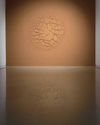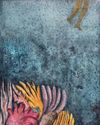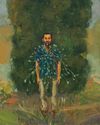
Post-modern critiques question art categories that were once aligned with the advancement of colonialism and the emergence of new art centres in the West. New debates around demarcations of high and low art, rural and urban contexts, insider and outsider positions, tradition and modernity, and the centre and the periphery, help problematize older knowledge systems.
Exhibitions like “Primitivism” in 20th Century Art: Affinity of the Tribal and the Modern (1984) at The Museum of Modern Art, New York; the 3rd edition of the Havana Biennale (1987) in Cuba titled Tradition and Contemporaneity; and Magiciens de la Terre at Centre Pompidou (1989) in Paris; laid the foundations for many relevant debates and considerably altered and questioned the way art was perceived (Das 2017, 33). The 1980s thus marked a change: artists from non-academic backgrounds and lesser-known traditions began getting exhibited with their contemporaries from around the world.
Aligning with these international debates, Bharat Bhavan, a multi-arts complex initiated by the Government of India in 1982 and led by the modernist artist J. Swaminathan was developed in Bhopal in Central India. Within the Bharat Bhavan, Swami (as he was fondly called) created a dream project, Roopankar, a museum dedicated to the unknown arts of Madhya Pradesh, and gave folk artists a platform where they would be exhibited as India’s modern artists, without focusing on their ethnographic affinities. They would be appreciated for their artistic qualities (Jain 2011, 19; Dutta 2018, 109; Das 2017, 28; see also Sheikh 1997, 17). Consciously or sub-consciously, Swami had aligned himself to the global discourse of the 1980s, perhaps even theorized it before many others. It was during this search for rural or folk art that Swami’s team stumbled upon a clay relief made by Jangarh Singh Shyam (1961-2001) in his village Patangarh.
This story is from the {{IssueName}} edition of {{MagazineName}}.
Start your 7-day Magzter GOLD free trial to access thousands of curated premium stories, and 9,000+ magazines and newspapers.
Already a subscriber ? Sign In
This story is from the {{IssueName}} edition of {{MagazineName}}.
Start your 7-day Magzter GOLD free trial to access thousands of curated premium stories, and 9,000+ magazines and newspapers.
Already a subscriber? Sign In

Parts, Wholes And The Spaces In Between
Sonal Sundararajan introduces Samira Rathod's free-spirited and rebellious explorations in the world of architecture, furniture and design.

"The Fine Art of Going to the Pictures."
Dr. Banerjee in Dr. Kulkarni's Nursing Home at Chemould Prescott Road brings together 26 paintings featuring a series of dramatic scenes from Hindi and Bengali films. In conversation with Abhay Sardesai, artist Atul Dodiya talks about childhood trips to movie halls, painted figures gripped by tension, and the closeness and remoteness of cinematic images.

"To Finally Have Something of Your Own to Mine."
Dayanita Singh is the recipient of the coveted 2022 Hasselblad Award. Keeping the photograph at the centre, she speaks to Shreevatsa Nevatia about books, book objects, photo novels, exhibitions and museums.

OF DIVINE LOSS
Shaurya Kumar explores the relationship between the subject and object of devotion, finds Aranya.

THE PAST AND ITS SHADOWS
Neha Mitra visits two shows and three artists in Mumbai.

FORCE OF NATURE
Alwar Balasubramaniam dwells on absences and ephemeralities in his new work, states Meera Menezes.

SHAPES OF WATER
Devika Sundar's works delineate the murky, malleable boundaries between the human body and the organic world, says Joshua Muyiwa.

INTIMATIONS OF INTIMACY
Sunil Gupta shares his journey with Gautami Reddy.

THE FRACTURED PROSPECT
Nocturnal landscapes as ruins in the making? Adwait Singh looks at Biraaj Dodiya's scenes of loss.

TEETERING BEYOND OUR GRASP
Meera Menezes traces Mahesh Baliga's journey from Moodabidri to London.